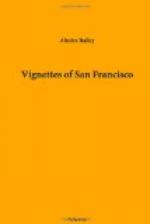People with accumulative minds wander through the museum, very interesting, “Just look at this mosaic, John.” Exhibit of modern art in the gallery. “Portrait of a girl,” only a daub to the wayfaring man,
Lovers in secluded places stealing a kiss, caught by the middle-aged. “Silly young things,” wistfully.
Once all parks were private grounds. Free now to the poorest serf. Well, there’s something century-gained. Some people say the world’s growing worse all the time. Perhaps, perhaps. . . .
Who cares. Lying flat on your back close to the smell of the earth, the great kind mother. Up, up at the sky, how deep, how blue. Is there a God? There must be Something; look at each perfect blade of grass. An airplane across the blue. There’s something gained.
Automobiles in stately procession proud as horses ever were. Automobiles proudly rolling, swings swinging, people passing, and the swimming of all the water fowls, the swans, the Japanese ducks and the little mud hens. Infinitude of movement, infinitude of life, ineffable beauty. There must be a God. There must be Something back of it all.
Extra Fresh
Some one in San Francisco keeps hens. Not only hens, but a rooster. I distinctly heard him crow. It was in the very early morning, and like Tennyson’s “Queen of the May” — lying broad awake — “I did not hear the dog howl, mother, but I did hear this crow.”
It is Ralph Waldo Trine, I think, who says that “So long as there remaineth in it the crow of a cock or the lay of a hen a city is not a city.” But I would not base the citifiedness of a city upon the mere crow of a cock any more than on the census. It is a vulgar criterion.
For human nature is human nature and nothing betrays human nature like hens. It is not surprising, therefore, that some woman has sneaked into the city limits a mess of hens. Neither is it an aspersion on the police.
Besides this was to be about eggs.
Has anyone noticed how eggs of late years are never just eggs, but classified? The hens seem to lay them classified. There are hen eggs and pullet eggs and large hen eggs and small hen eggs and large pullet eggs and small pullet eggs and strictly fresh eggs and ranch eggs and choice eggs and large dark eggs and all-mixed eggs and fresh cracked eggs and mixed color eggs and small brown and, oh, hundreds of sub-divisions.
The very latest I noticed were “dirty” eggs, 2 cents cheaper. I look next for “small dirty eggs.” Why should they sound so unrefined? More so some way than “small dirty boys.” But an artist must paint life as he sees it and I saw these “dirty” eggs on that bazaar — and bizarre — of diversities — Fillmore street.
On Haight street I saw “extra fresh eggs” and how an egg can be more than “fresh” I fail to see. Now, a man may be “extra fresh,” but an egg is different. Even if it left the hen early it would still be only “fresh.” Well, the grocer probably knows.




